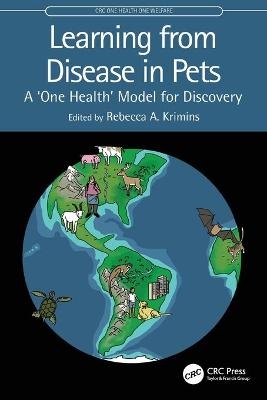
Learning from Disease in Pets
CRC Press (Verlag)
978-0-367-17310-4 (ISBN)
Learning from Disease in Pets: A ‘One Health’ Model for Discovery is the first encompassing reference guide for veterinarians, researchers and physicians on conducting studies using spontaneous models of disease in animals. The study of naturally occurring disease in (pet) animals can help model our understanding of the biology, prevention and therapy of human and animal diseases. Studies of pet dogs, for instance, can aid treatment of complex medical problems such as cancer, orthopedic, cardiopulmonary, and neuro-inflammatory diseases, and zoonotic infections. Each chapter within this novel cross-species approach is contributed by a leader, or leaders, in their field of research.
Using clinical trials to learn how pets with real diseases respond to therapy can lead to breakthroughs in human medicine, as well as benefiting pets suffering from otherwise debilitating illness. Despite similarities of diseases across species, there are very few spontaneous models of disease used in research compared with models where disease is induced in healthy laboratory animals. Many medical researchers and veterinarians have a multitude of questions regarding how to use naturally occurring diseases in pets for the discovery of treatments and diagnostics: this book will demonstrate how to safely make this happen.
This book encourages veterinarians to build on and disseminate existing findings for the wider benefit of pets and humans. Many pets suffering from incurable illnesses may benefit from clinical trials; the book includes a section on the imperative communication styles necessary within the research environment and with clients, a compelling discussion on the ethics of using pets in veterinary clinical research, comprehensive tables of diseases that spontaneously occur in animals and humans, the regulatory requirements necessary to move therapy from benchside research to patient bedside, as well as intricate details on how to design a robust clinical study.
Dr. Rebecca Krimins is an Assistant Professor in the Johns Hopkins Medicine Department of Radiology and Radiological Science, with additional appointments in the Department of Anesthesiology and Critical Care Medicine and the Department of Molecular and Comparative Pathobiology. A native of Annapolis, Maryland, Dr. Krimins completed her veterinary anesthesia and analgesia residency at the Purdue University School of Veterinary Medicine. Dr. Krimins has more than 15 years of experience in managing critically ill patients during advanced imaging procedures and conducting cutting-edge clinical studies. Dr. Krimins’ specialty in veterinary anesthesia, sedation and pain management in combination with her experience in directing advanced clinical research offers each veterinary patient the best opportunities for diagnosis and therapy. Dr. Krimins works closely with each patient's personal veterinarian and pet family to ensure accurate and timely results that are crucial for therapeutic options. The Veterinary Clinical Trials Network at Johns Hopkins University is designed to leverage the expertise and platforms available at Johns Hopkins University in order to transform newly discovered diagnostics and therapeutics into real-life practical approaches that benefit veterinary patients
Foreword by Chand Khanna, Ethos Veterinary. The Contribution of Pets to Human and Veterinary Medicine. Companion Animals Models of Human Disease. Specific Diseases of Large Animals and Man. Cancer Research is Leading the Way. Investment Dynamics in the World of Pharma. How to Perform Research in Spontaneous Models of Disease. The Use of Animals in Research. DNA Methods in Veterinary Medicine. The Importance of Collecting Tissue from Pets. The FDA New Animal Drug Approval Process. Clinical Trials, Patient Recruitment and Advertising. One Health: Animals, Humans and Our Planet. Communications and Expectations. Ethical Considerations. Appendix A: Funding for Veterinary Clinical Research. Appendix B: Resources for Veterinary Clinical Research (also available as online Download).
| Erscheinungsdatum | 16.01.2021 |
|---|---|
| Reihe/Serie | CRC One Health One Welfare |
| Zusatzinfo | 14 Tables, black and white; 17 Illustrations, black and white |
| Verlagsort | London |
| Sprache | englisch |
| Maße | 152 x 229 mm |
| Gewicht | 453 g |
| Themenwelt | Medizin / Pharmazie ► Medizinische Fachgebiete ► Medizinethik |
| Studium ► Querschnittsbereiche ► Geschichte / Ethik der Medizin | |
| Naturwissenschaften ► Biologie ► Zoologie | |
| Technik | |
| Weitere Fachgebiete ► Land- / Forstwirtschaft / Fischerei | |
| ISBN-10 | 0-367-17310-7 / 0367173107 |
| ISBN-13 | 978-0-367-17310-4 / 9780367173104 |
| Zustand | Neuware |
| Informationen gemäß Produktsicherheitsverordnung (GPSR) | |
| Haben Sie eine Frage zum Produkt? |
aus dem Bereich


